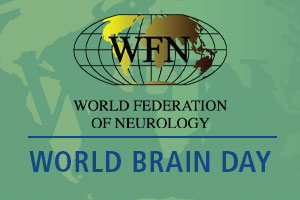The campaign has driven more than a decade of progress and global advocacy.
By Prof. Tissa Wijeratne
Co-Chair of World Brain Day
 The World Brain Day (WBD) campaigns from 2014 to 2025 have played a transformative role in advancing global awareness, advocacy, and action for brain health. Over the past decade, WBD has evolved into a powerful platform for raising awareness, influencing policies, and promoting best practices for neurological care and prevention. Each year, the campaign has focused on a key theme, driving international collaboration among health care professionals, policymakers, and the public.
The World Brain Day (WBD) campaigns from 2014 to 2025 have played a transformative role in advancing global awareness, advocacy, and action for brain health. Over the past decade, WBD has evolved into a powerful platform for raising awareness, influencing policies, and promoting best practices for neurological care and prevention. Each year, the campaign has focused on a key theme, driving international collaboration among health care professionals, policymakers, and the public.
The journey began in 2014 with the theme of “Our Brain, Our Future” emphasizing the critical need to prioritize brain health worldwide. This foundational campaign set the stage for subsequent years, each highlighting an urgent neurological challenge. Topics by year have included:
- 2015: Epilepsy
- 2016: Brain Health and Aging
- 2017: Stroke
- 2018: The Impact of Air Pollution on Brain Health
- 2019: Migraine
- 2020: Parkinson’s Disease
- 2021: Multiple Sclerosis
- 2022: Brain Health for All – reinforcing the necessity of brain health for global well-being
- 2023: Brain Health and Disability – advocating for early intervention, rehabilitation access, and social inclusion
The 2024 campaign marked a major milestone with its focus on “Brain Health and Prevention,” aligning closely with the WHO’s Intersectoral Global Action Plan (IGAP) on Epilepsy and Other Neurological Disorders. This initiative underscores the importance of prevention, early diagnosis, and equitable access to neurological care, promoting the WHO IGAP toolkit to reduce the global burden of neurological diseases and improve health outcomes worldwide.
Looking ahead, the 2025 World Brain Day will champion the theme of “Brain Health for All Ages,” emphasizing the lifelong importance of brain health and the need for targeted interventions at every stage of life. This campaign will be a historic effort, as it marks the first time WBD will work directly with both the United Nations Economic and Social Council (ECOSOC) and the WHO, ensuring that brain health remains at the forefront of global health policy and advocacy efforts across all six regions.
These campaigns have been instrumental in driving global action, influencing neurology policies, public health strategies, and clinical care improvements. The success of World Brain Day is a testament to the unwavering support and commitment of neurology societies worldwide, which have worked to advance brain health education, advocacy, and intervention programs.
On behalf of the global neurology community, we extend our deepest gratitude to every neurology society, health care professional, researcher, and advocate who has contributed to this movement. Your dedication has helped shape a future where brain health is prioritized for all. Together, we continue to push forward, working toward a world in which everyone, regardless of age or background, has access to the best possible brain health care and preventive strategies. •
Prof. Tissa Wijeratne is co-chair of World Brain Day and a WFN elected trustee.
